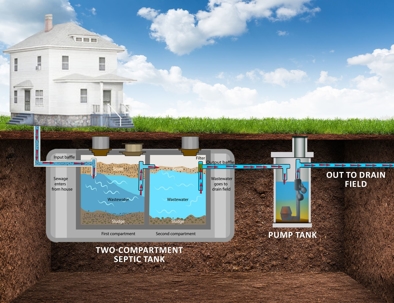You step outside to enjoy your backyard, but something unusual catches your eye: water pooling around your septic tank. Suddenly, your peaceful moment turns into a puzzle.
Why is there water around your septic tank? This isn’t just an inconvenience; it could be a sign of a bigger problem. Ignoring it might lead to costly repairs and unpleasant odors. Don’t let this mystery linger. By understanding the reasons behind the water buildup, you can take control and avoid future headaches.
Dive into this article to uncover the causes and learn what steps you can take to protect your home and your wallet.

Credit: theoriginalplumber.com
Signs Of Septic Tank Problems
Water pooling around a septic tank often signals a problem, such as blockages or leaks. Foul odors and slow drains are other signs. It’s crucial to address these issues promptly to prevent further damage and contamination.
Have you ever noticed water pooling around your septic tank and wondered why? This could be a sign that your septic system is in trouble. Recognizing the signs of septic tank problems early can save you a lot of hassle and expense. Let’s dive into some of the key indicators that your septic system might need attention.Wet Spots In The Yard
One of the most visible signs that your septic system may be failing is the appearance of wet spots in your yard. These spots might seem random, but they’re telling a story. They often occur because the septic tank is full or the drainage field is overloaded. Imagine walking across your lawn, and suddenly, your foot sinks into a soggy patch. This isn’t just inconvenient—it’s a red flag. It might mean your septic tank isn’t processing waste properly. If you notice these wet spots, it’s time to investigate further. Check if they’re near the septic tank or the drainage field. That information can help pinpoint the issue.Unpleasant Odors
Another clear sign of septic trouble is unpleasant odors. These aren’t just any smells; they’re strong and often reminiscent of sewage. If you’re catching whiffs of something foul in your yard, your septic system might be struggling. Think about the last time you walked by your septic tank and noticed a strong odor. It might have made you wrinkle your nose and quicken your pace. That’s your system’s way of signaling distress. These odors can seep into your home too, especially if there’s a backup. If you’re frequently lighting candles or using air fresheners to mask a persistent smell, it could be time to check your septic system. In your experience, have you noticed these signs before? Addressing them promptly can prevent more significant issues down the road. It’s all about being proactive and listening to what your yard and nose are telling you.
Credit: www.acesepticandwaste.com
Common Causes Of Water Accumulation
Finding water pooling around your septic tank can be a puzzling and frustrating experience. This unexpected sight can lead you to wonder what might be causing the issue. Understanding the common causes of water accumulation around your septic tank is crucial for effective troubleshooting and prevention. Let’s dive into some of these causes and ensure your septic system remains in top condition.
Clogged Drain Field
A clogged drain field is a common culprit behind water accumulation around your septic tank. When the soil surrounding the drain field becomes compacted or saturated, it can no longer absorb the wastewater effectively. This leads to water backing up and pooling around the tank. Imagine the drain field as a sponge; once it’s full, there’s nowhere else for the water to go. Regular maintenance and inspection can prevent clogging and ensure the drain field functions properly.
Think about when you last checked your drain field. Is it overgrown with vegetation or showing signs of erosion? These are indicators that something might be amiss. Clearing excess vegetation and addressing soil erosion can restore proper drainage and prevent further issues.
Tank Overload
Another reason for water accumulation could be tank overload. If your septic tank is receiving more wastewater than it can handle, it might lead to overflow. This often happens when household water usage increases unexpectedly, like hosting guests or during a big laundry day. Overloading can result in wastewater escaping from the tank and accumulating around it.
Consider your daily water habits. Are you mindful of your water usage, especially during peak times? Simple changes, like spacing out showers and laundry loads, can significantly reduce the risk of tank overload. Monitoring your water usage not only preserves your septic system but also conserves water.
Water around your septic tank should never be ignored. Identifying the cause early can save you from costly repairs and potential health hazards. Are you taking the necessary steps to ensure your septic system is functioning optimally? Regular checks and mindful usage can make all the difference.
Environmental Factors
Water around your septic tank can be a concern. Environmental factors often play a significant role in this situation. Changes in weather patterns and the water table can impact your septic system. Understanding these factors can help you manage and maintain your system effectively.
Heavy Rainfall
Heavy rainfall can cause water to gather around your septic tank. Rainwater saturates the soil quickly. This leaves little room for wastewater from the tank. As a result, water may pool on the surface. It is crucial to monitor rainfall levels. This helps to prevent potential overflow or system failure.
Groundwater Levels
High groundwater levels can affect your septic system. When groundwater rises, it can seep into the septic tank. This increases the water level inside the tank. It may cause the system to stop working efficiently. Regular checks of groundwater levels can help in early detection. Early intervention can prevent costly repairs.

Credit: www.wrenvironmental.com
Impact On Your Property
Discovering water around your septic tank can be alarming. It affects not only your plumbing but also your property. Understanding the impact on your property is crucial. It helps in taking timely action. This issue can lead to significant challenges.
Landscaping Challenges
Excess water can harm your garden. Plants might not survive overwatering. It can cause soil erosion. This might damage your lawn or garden beds. Wet soil is often unstable. It can lead to uneven ground. Your backyard might become a muddy mess. This poses a safety risk for family and pets. You may notice unpleasant odors. These are not good for outdoor enjoyment.
Health Risks
Water around the septic tank can pose health risks. It may contain harmful bacteria. These bacteria can spread diseases. Families, especially kids, are at risk. Pets are also vulnerable. Contaminated water may enter drinking sources. This is hazardous to health. Mosquitoes thrive in stagnant water. They can spread diseases like West Nile Virus. Protecting your health is essential.
Preventative Measures
Water pooling around your septic tank might signal a problem. Regular inspections help catch issues early. Proper maintenance can prevent costly repairs and ensure your septic system runs smoothly.
Preventing water accumulation around your septic tank is crucial to maintaining a healthy and efficient system. You might be wondering how you can avoid this frustrating issue. The key lies in taking proactive steps to ensure your septic system functions smoothly. By focusing on regular upkeep and mindful waste disposal, you can prevent potential problems before they arise.Regular Maintenance
Regular maintenance of your septic tank is vital. Consider scheduling an annual inspection by a professional. This helps in identifying minor issues before they turn into costly repairs. Pumping your septic tank every three to five years is also essential. This depends on the size of your household and tank capacity. Ask yourself, when was the last time your tank was pumped? Keep an eye out for warning signs such as slow drains or unpleasant odors. These can indicate a problem that needs immediate attention. By acting swiftly, you can save yourself from a messy situation.Proper Waste Disposal
Proper waste disposal plays a significant role in preventing septic tank issues. Be mindful of what you flush down the toilet or drain. Items like wipes, diapers, and grease can clog your system. Use biodegradable cleaning products whenever possible. These are less harsh on your septic system. You might be surprised at how much of a difference this simple change can make. Educate your family about what can and cannot go into the septic tank. Make it a household rule to protect your system. Is everyone in your home aware of these guidelines? Taking these preventative measures can save you time, money, and stress. By being proactive, you ensure that your septic system remains in top condition. What steps will you take today to protect your septic tank?When To Call A Professional
Have you ever found yourself standing in your yard, puzzled by a mysterious pool of water around your septic tank? It’s more than just an inconvenience—it can be a sign of a serious problem. Understanding when to call a professional can save you time, money, and hassle. Let’s explore the key moments that signal it’s time to get expert help.
Persistent Water Issues
If water is consistently pooling around your septic tank, it’s not just a one-off situation. A few rainy days might lead to temporary water collection, but if this becomes a regular occurrence, it’s a red flag. Persistent water issues might suggest a failing drain field or a blocked pipe.
Have you noticed foul odors accompanying the water? That’s another sign that something more serious could be at play. Don’t wait for the problem to escalate. Calling a professional early can prevent further damage and costly repairs.
Structural Concerns
Cracks or damage to the septic tank or its components are a cause for immediate concern. These issues can allow water to escape or enter the tank, disrupting its function. Do you see unusual dips or depressions in the ground near your tank? These might indicate a structural failure.
Ignoring structural concerns is risky. A compromised septic tank can lead to environmental hazards and health risks for you and your family. A professional can assess and address these issues before they get out of hand.
So, have you been monitoring the situation around your septic system? If you spot any of these signs, it’s wise to act promptly. Engaging a professional might feel like a big step, but it ensures that your septic system remains safe and functional, protecting your home and peace of mind.
Frequently Asked Questions
Why Is My Septic Tank Surrounded By Water?
It might be due to heavy rain, plumbing leaks, or septic system failure. Check for clogs or drainage issues.
Can Rain Cause Water Around Septic Tank?
Yes, excessive rain can overwhelm the system. It might lead to pooling around the tank. Ensure proper drainage.
How Do I Fix Septic Tank Water Issues?
Inspect for leaks or clogs. Pump the tank if needed. Consult professionals for persistent problems.
Is Water Around Septic Tank Dangerous?
Yes, it can indicate system failure. It might contaminate groundwater. Address the issue promptly to prevent health risks.
What Are Signs Of Septic Tank Problems?
Pooling water, foul odors, slow drains, and lush grass patches. These suggest septic system malfunctions. Seek professional help.
Conclusion
Water around your septic tank can signal issues. Addressing these promptly is vital. Ignoring the signs can lead to costly repairs. Regular maintenance helps prevent problems. Check for leaks or blockages often. Keep heavy items away from the tank area.
This prevents potential damage. Understanding the signs ensures a healthy septic system. A well-maintained system keeps your home safe. Seek professional help if needed. Protect your property and environment. Always stay informed about your septic system. This knowledge empowers you.
Stay vigilant and proactive. Your home’s health depends on it.





